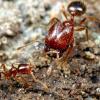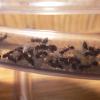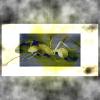- Formiculture.com
- Forums
- Gallery
- Members
- Member Map
- Chat

NYC Tap water , bottle or distill water for drinking water
Started By
rcflyer
, Oct 13 2020 8:09 PM
6 replies to this topic
#1
 Offline
-
Posted October 13 2020 - 8:09 PM
Offline
-
Posted October 13 2020 - 8:09 PM
Is is ok to moisture my Mini Heath With local [NewYork city) tap water? What about drinking water for ants? Or do I have to use bottle or distill water?
#2
 Offline
-
Posted October 13 2020 - 9:00 PM
Offline
-
Posted October 13 2020 - 9:00 PM
In my opinion, you should use bottled or distilled water.
My Ants:
(x1) Campontous semitstaceus ~20 workers, 1 Queen
(x1) Camponotus vicinus ~10 workers, 1 Queen (all black variety)
(x1) Tetramorium immigrans ~100 workers, 1 Queen
(x1) Myrmercocystus mexicanus -1 Queen
(x2) Mymercocystus mimcus -1 Queen
(x1) Mymercocystus testaceus ~45 workers, 1 Queen
(x1) Campontous semitstaceus ~20 workers, 1 Queen
(x1) Camponotus vicinus ~10 workers, 1 Queen (all black variety)
(x1) Tetramorium immigrans ~100 workers, 1 Queen
(x1) Myrmercocystus mexicanus -1 Queen
(x2) Mymercocystus mimcus -1 Queen
(x1) Mymercocystus testaceus ~45 workers, 1 Queen
#3
 Offline
-
Posted October 14 2020 - 12:57 AM
Offline
-
Posted October 14 2020 - 12:57 AM
Is is ok to moisture my Mini Heath With local [NewYork city) tap water? What about drinking water for ants? Or do I have to use bottle or distill water?
I use distilled water in the moisture dish to minimize mineral buildup since you can't really clean it often.
I use bottled water for the nestmates and all my colonies seem to drink it just fine. I buy store brands.
#4
 Offline
-
Posted October 14 2020 - 2:44 AM
Offline
-
Posted October 14 2020 - 2:44 AM
I use filtered tap water. I filter it with one of those pitcher type filters. Straight tap water is fine, too. Ants aren’t that delicate.
- Ants_Dakota likes this
"The ants are a people not strong, yet they prepare their meat in the summer." Prov. 30:25
Keep ordinary ants in extraordinary ways.
Keep ordinary ants in extraordinary ways.
#5
 Offline
-
Posted October 14 2020 - 4:28 AM
Offline
-
Posted October 14 2020 - 4:28 AM
Yes everyone says don't use tap water, but we use tap water everyday in our houses for many things that include us in it. I don't use tap water but when i get the chance i do because i currently have mine in a shed so i have a bottle of water from inside my house.
We don’t talk about that
#6
 Online
-
Posted October 14 2020 - 5:07 AM
Online
-
Posted October 14 2020 - 5:07 AM
i know in South Dakota, tap water is naturally hard, so i try not to use it just in case. it may be different up there.
Go to the ant, you sluggard; consider its ways and be wise! It has no commander, no overseer or ruler, yet it stores its provisions in summer and gathers its food at harvest. -Proverbs 6: 6-8
My Ant Shop Here I have PPQ-526 permits to ship ants nationwide
Attention Ant-Keepers in South Dakota! Join the SoDak(Society Of Dakotan Ant Keepers)
#7
 Offline
-
Posted October 14 2020 - 12:22 PM
Offline
-
Posted October 14 2020 - 12:22 PM
Mineral build-up is why I use distilled usually, but sometimes I just use tap water.
Formiculture Journals::
Veromessor pergandei, andrei; Novomessor cockerelli
Camponotus fragilis; also separate journal: Camponotus sansabeanus (inactive), vicinus, laevigatus/quercicola
Liometopum occidentale; Prenolepis imparis; Myrmecocystus mexicanus (inactive)
Pogonomyrmex subnitidus and californicus (inactive)
Tetramorium sp.
Termites: Zootermopsis angusticollis
Isopods: A. gestroi, granulatum, kluugi, maculatum, vulgare; C. murina; P. hoffmannseggi, P. haasi, P. ornatus; V. parvus
Spoods: Phidippus sp.
1 user(s) are reading this topic
0 members, 1 guests, 0 anonymous users



















